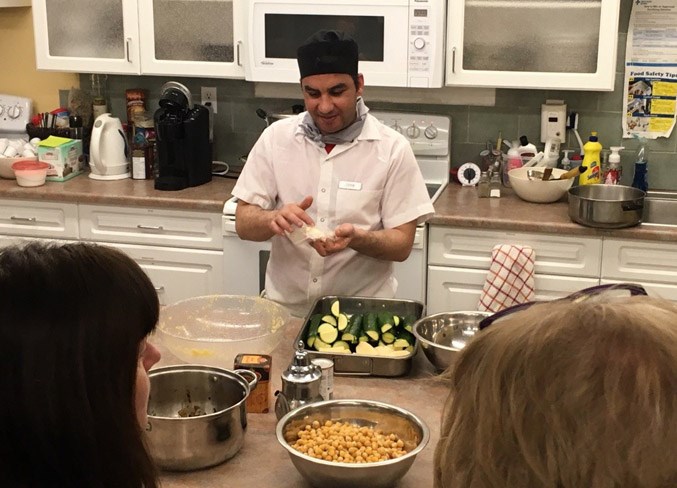A group of about 30 foodies crowd around a counter where chef Tarik Ghazal is mounding a platter of Moroccan 7 Vegetable Couscous, a traditional North African comfort food popularized by Berbers.
A line cook at St. Albert’s East Side Mario’s, the professional chef has volunteered time and resources to prepare a Moroccan feast as part of the St. Albert Community Village Cultural Kitchen program.
“I like to show people the food of my country,” said Ghazal speaking in a heavy accent. Originally from Casablanca, he arrived in Canada in 2017 stopping first at Newfoundland and Montreal before coming west to St. Albert.
He is slated to serve a dinner at 7:30 p.m., but arrives at 4 p.m. to marinate two chickens in a mild savoury blend of ginger, saffron, turmeric, paprika, salt and pepper.
While the chicken absorbs new flavours, he quarters seven vegetables: tomatoes, zucchini, carrots, cabbage, potatoes and eggplant while boiling chickpeas on the stove. (The number seven is considered lucky in Morocco).
But what attracts participants is a couscoussier sitting on the stove, a traditional double-chambered food steamer used in Arabic and North African countries to cook couscous.
Similar to a double broiler, the larger bottom pot is filled with either water or soup that produces steam. It seeps through the perforated base of the top pot filled with couscous and into the grains.
Ghazal cooks one batch of couscous three times for 15 minutes. After each allotted cooking time he fluffs up the grains. During the second cooking, he adds smen, a type of salted fermented butter that enhances the couscous’ flavour.
Watching the multiple cookings, one woman mentions that she just buys a package of couscous and throws it in water. A series of heads nod in agreement.
“This is the traditional way. It tastes better,” said Ghazal, smiling.
While the couscous cooks, the chickens are browned and partially cooked with vegetables before they are popped in the oven for 25 minutes. Fragrant aromas permeate every corner, triggering the salivary glands. Fortunately, every dish is perfectly timed to finish cooking at the same moment.
Candace Hiltz and hubby Sgt. Mark Bell are first time attendees whose hobbies include travel, history, food and culture. They just returned from a European jaunt touring Christmas markets and are planning a vacation to Morocco in two years.
“I loved the presentation,” said Hiltz while sampling the dish. “We’re used to trying different types of food. Before we go, we wanted to try Moroccan food done professionally as opposed to doing it on our own.”
Both Hiltz and Bell were surprised the food was less spicy than anticipated. Interestingly, Moroccan cuisine uses a similar medley of Indian spices, however, a smaller quantity is used to create a milder taste.
But for the couple, surprise is part of the adventure and Ghazal’s presentation received a unanimous thumbs-up.
Now in its sixth year of operation, the Cultural Kitchen has hosted 36 countries with 1,631 participants attending. Part cooking lesson, part workshop and part meal sampler, these twice monthly events are more than an opportunity to tuck into a warm meal free of charge. Yes, the events are free.
Certainly the Cultural Kitchen is about learning new cooking techniques, trying new tastes and getting to know different people. It also takes food preparation back to the human side of cooking where a kitchen is the heart of a gathering spot and a comfortable vehicle of communication between individuals.
“Our most well-attended events are never Canadian. Some people want the comfort of food from their own culture. But many people who attend want to sample the similarities and differences of other foods and cultures,” said Leanne MacMillan, community development co-ordinator.
Even though Ghazal spent nearly four hours on his feet juggling multiple pots and pans, he was all smiles at evening’s end. A ball of energy, he bounced back quickly and is even planning to serve an international feast at a future date.
The Cultural Kitchen hosts dinners/food prep classes every two weeks at the St. Albert Community Village and Food Bank, #30, 50 Bellerose Dr.
Upcoming Cultural Kitchen events introduce:
- St. Lucia, Jan. 22
- Sri Lanka, Feb. 5
- Mexico, Feb. 19




